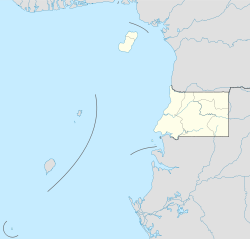Port Clarence (Fernando Po)
| Malabo | |
|---|---|

Venus Bay
|
|
| Location in Bioko | |
| Coordinates: 3°45′7.43″N 8°46′25.32″E / 3.7520639°N 8.7737000°E | |
| Country |
|
| Province | Bioko Norte Province |
| Founded | 1827 |
| Current name | Since 1973 |
| Elevation | 0 m (0 ft) |
| Population (2012) | |
| • Total | 187,302 |
| Demonym(s) | Malabeño-a |
| Time zone | WAT (UTC+1) |
| Climate | Am |
Malabo /məˈlɑːboʊ/ (formerly Santa Isabel) is the capital of Equatorial Guinea and the province of Bioko Norte. It is located on the north coast of the island of Bioko, formerly known by the Bubis, its indigenous inhabitants, as Etulá, and as Fernando Pó by the Europeans. The city has a population of approximately 187,302 inhabitants.
Spanish is the official language of the city and of the country as well. Spanish is the most-spoken language and practically the only one used, except some French and Portuguese.
Malabo is the oldest city in Equatorial Guinea. Many buildings in the city are built in a colonial style, dating from the times of Spanish rule, coexisting with modern buildings built since independence. The downtown streets have a square design, with pedestrian areas. This phenomenon causes a feeling of architecture attenuated by the low height of buildings in a combination of architectural Westernization and Africanism.
Oyala is a planned city currently under construction in mainland Equatorial Guinea which was designed to replace Malabo as the capital. The institutions of governance of Equatorial Guinea began the process of locating to Oyala in February 2017.
In 1472, in an attempt to find a new route to India, the Portuguese navigator Fernão do Pó, encountered the island of Bioko, which he called "Formosa". Later the island was named after its discoverer, Fernando Pó. At the beginning of 16th century, specifically in 1507, the Portuguese Ramos de Esquivel made a first attempt at colonization on the island of Fernando Pó. He established a factory in Concepción (current Riaba) and developed plantations of sugarcane, but the hostility of the insular Bubi people and diseases ended this experience quickly.
...
Wikipedia


